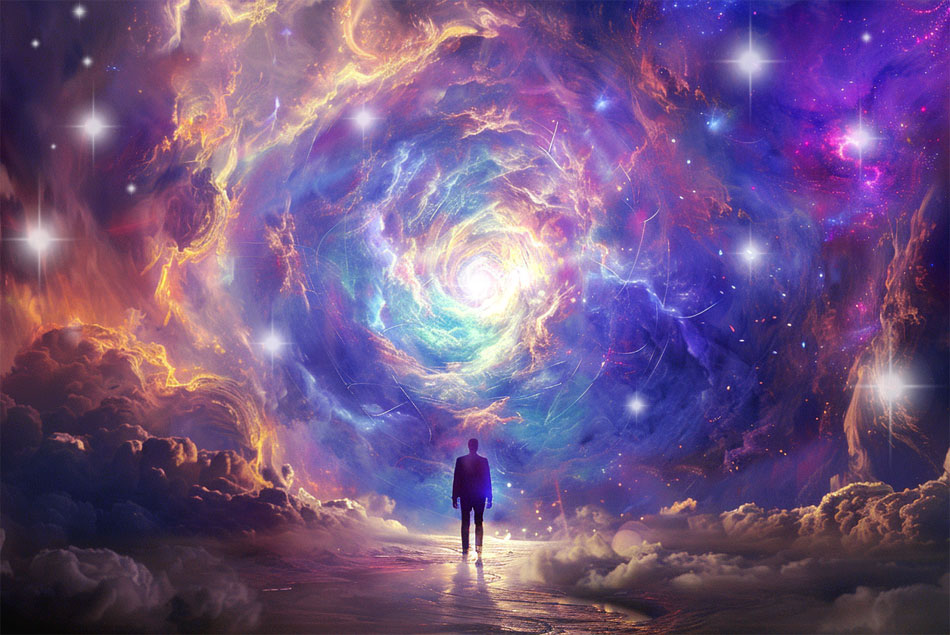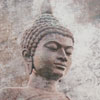Reincarnation: Answering Unanswered Questions ~ Part II
 by Irving S. Cooper
by Irving S. Cooper
The chief purpose of reincarnation is education. To this end we are born again and again on earth, not because of any external pressure, but because we, as souls, desire to grow. The driving-power at the back of reincarnation, which brings us to earth again, is the thirst for experience, the desire for knowledge, the yearning to mingle in the throb and rush of physical existence. To many people, whose lives here have been rather difficult, these desires seem inconceivable. The reason is that satiety kills out desire; a man who has just eaten a hearty dinner has no desire to think of other meals. In the same way, at the end of an incarnation, it is to be expected that we should have little desire for rebirth. Furthermore, our waking consciousness is only a portion of our actual consciousness, and our deeper selves often realize the need of that for which our outer selves do not care. This is the case with reincarnation; the physical consciousness, limited in outlook to the narrow horizons of a single earth-life, does not desire to be reborn, but the soul consciousness, having a splendid goal in view, is anxious to return.
In the vague ideas that are current regarding the human soul, it is not realized that power, wisdom, and character are all the results of an age-long education, and not the carelessly scattered gifts of some whimsical destiny. There is soul growth as well as physical growth; there is an awakening of mental faculty during a whole series of lives in much the same way as there is an awakening of the mind at the beginning of each life on earth during that period we call childhood.
Life’s great purpose is to develop our inherent powers. As we grow we do not add anything unto ourselves; we only arouse that which we have already slumbering within. Exactly the same process takes place when a seed sprouts; the germ within merely begins to unfold what is already contained within it. Growth is the stirring of latent powers and faculties to active expression. We, as souls, contain within ourselves everything we shall have hereafter, and the purpose of a series of lives on earth is to bring to us those experiences that will most rapidly awaken all our latent faculties and bring them into action.
Within each soul infinity lies hidden; in a sense each human being is the center of the universe, for God lives equally in all. If the character of our neighbor is adorned with a virtue which we have not, if he is equipped with a sterling quality which we admire, it is not that he has been given more than we, but that he has awakened into activity that particular virtue or quality sooner than we. If we wish to become like him, there is nothing to prevent our making the efforts, which surely will bring our desire to fruition.
The glorious imagery of the gifted artist, the divine harmonies of the inspired musician, the keen mentality and patience of the scientist, the profundity of the philosopher, the wisdom of the born teacher—all these powers, and many more, lie hidden within us awaiting the time when we shall arouse them with the magic of the will.
There is neither great nor small, old nor young, wise nor ignorant, from the Godward side of the universe; all is God. But from the material side of the universe God is expressed in different degrees of power, according to the capacity of the form. If the form be dense and unresponsive, little of the indwelling Divinity can manifest itself; if the form be pure, refined, and far-evolved, the inward God is able to shine forth with such blinding glory that we bow our heads in reverence and adoration.
The evolution of forms is one of the functions of the World-School, but this is only one side of the whole process, for by growth we imply not only the development of forms in this and other worlds, but also the unfolding of the powers of consciousness. As growth takes place, the immeasurable Life behind is able ever more and more to manifest beauty and its power. On the matter side of evolution is seen the slow transformation of mineral to plant, plant to animal, animal to man, man to superman; on the life side is seen the over brooding spiritual Life gradually learning to inhabit and control these bodies built of matter.
We are a race of resplendent spiritual Beings—such has ever been the message of the Seers of all ages—who descended from our high estate at some period hidden in the mists of the illimitable past, in order to gain the mastery of matter such as is taught in a material solar system. At the time we commenced our evolution in the universe of matter, we found it impossible to interpret the meaning of its vibrations or to make the matter respond to the changes of our consciousness. Thus, while we possessed all the powers of our divine Father, they were as yet merely potential, latent, so far as outer existence was concerned. As eon after eon swept on in unhurried flight we began slowly to force matter to obey our will, until now, as human beings, we have progressed to the stage where we can understand physical vibrations—the slowest of all—and control a physical body; where we are able, partially at least, to understand the meaning of the vibrations of the astral world and assume some control over our emotional body; but where we know little as yet of those regions in which dwell mind and soul.
It is helpful to the young student to bear in mind that the physical body of a human being is surrounded and interpenetrated by a luminous ovoid composed of the emotional, mental, and soul bodies, in much the same way that the unseen mental and astral worlds surround and interpenetrate the earth. The analogy, however, should not be carried farther. All these bodies are but forms in which the Spirit is unfolding; even the soul body itself may be thought of as a radiant and flashing chalice of subtle matter in which is glowing a fragment of the Life that is God.
Thus we have, in this World-School, old and young physical bodies whose age is measured by the years which stretch between the cradle and the grave; also we have old and young souls whose vaster span of life is measured by hundreds of incarnations on earth; the Spirit alone is without measure, without age, without limit—the Source of all things.
What greater stimulus to courage and valiant exertion than the knowledge that the loftiest ideal of which we dream, the mightiest powers for which we long, the superb beauty of character to which we aspire, are all to be found within ourselves! To win them petitions need not be offered, and prayers are useless; we must work for their development, even as we labor hours at the piano to gain the power of musical expression. We stand like men above a buried treasure, and all we have to do is dig.
Every particle of wisdom stored up by the soul increases the precious treasure which we come here to gain, even as every drop of attar of roses falling from the still adds richness to the fragrant perfume which has already been gathered. But soul wisdom can be gained in no other way than by plucking in the gardens of the world the sweet and bitter blossoms of love and hate, action and sloth, success and failure, joy and sorrow, peace and turmoil. We grow as gradually we learn to master these conflicting forces and move with steady feet in the midst of a storm, or to take full advantage of a time of calm.
When we are reborn Nature is concerned primarily with only one thing, and that is our education. She does not try to amuse us or give us a good time; she teaches us through experience. Everything has its teaching value and broadening effect, and we should feel honored when life is hardest, for then it is that special pains are being taken with our education. What to us is usually regarded as a hardship or a sorrow is usually training of the greatest value. Our mistake lies in not looking at life from the standpoint of education; if we did, many of the most puzzling problems would disappear.
We should not, however, confuse Nature’s plan of education with that of the human teacher. There are two kinds of education: the education of the memory, which crowds the mind with facts more or less logically arranged according to the capacity of the student; and the education of the faculties, which sounds the depths of the inner nature and calls forth to activity the powers that are hidden there. The first is the usual method of the pedagogue, the second, that used in the World-School.
We are beginning to realize that real education is not limited to instruction in the various branches of learning—languages, mathematics, science, philosophy—which at best but stimulate the intellectual faculties; education in its truest sense should round out the whole character by building up a noble morality, encouraging generous emotions, disciplining the mind into accurate ways of thinking, teaching skill in action, awakening the power of the will, and developing the capacity to realize the Divine Presence.
No educational institution built by man ever attempted such instruction in full; the world is the only school that offers the entire curriculum. It might be even truer to say that the world is a great university, exquisitely adapted, down to its smallest detail, to the education of the swarming millions of living creatures that dwell upon its surface, in its interior, and within the atmosphere surrounding it. Each experience that comes to us, great or small, is part of the teaching. Naturally, we do not all attend the same classes or study the same lessons, for we are not all of the same soul-age, but every living thing—atom, microbe, plant, bird, animal, man, superman, or angel—receives just those experiences which are needed to insure its next step forward in evolution.
Unfortunately, we are far from being convinced of this. It may be true, we admit, for other people, but not for ourselves. We are constantly picturing to ourselves different surroundings in which we are sure we could grow more rapidly, and as constantly, we ignore the very lessons, which our present circumstances in life are endeavoring to teach us.
For some reason few of us take advantage of the teaching of daily life, unless forced to do so by some bitter experience. It often takes many lives to learn a single lesson of right and wrong, which might easily have been grasped in a year if we had applied ourselves to the problem, instead of thinking, as is usually our habit, that we have been injured or unhappily treated, and abusing Fate for her malignity. We run hither and thither like children after bright butterflies, and generally our mercurial attention receives but vague impressions from the valuable lessons which are offered. And so these same lessons are patiently repeated day after day, year after year, life after life, until finally their meaning dawns upon our inner vision. Sometimes the lessons which we persist in ignoring must be taught by pain in order to hold our wandering attention; sometimes they come with pleasures and captivating things which arouse desire. The loving Mother is always sublimely patient and uses many ways to teach her children.
If we were apt pupils our lives would be much freer from suffering than they are. Pain comes to us because of our ignorance, our willful disobedience, and our inattention. If we were eager to learn, if we joyfully welcomed each event as a gift for our helping, if we cooperated with the Divinely directed sweep of evolution instead of stubbornly resisting it, our growth would be rapid and our happiness unmarred. How long will it take us to realize that Divine Love is the matrix in which the universe is embedded, and that Divine Wisdom guides the vibration of every atom as well as the swing of the planets, the life of the least of us as well as the destinies of nations?
The memories of the experiences through which we have gone, and the recognition of their relationships to one another, constitute knowledge. Wisdom, however, is the realization of the inner meaning and spiritual purpose of the oft-repeated events of life. Thus wisdom is the essence distilled from knowledge by the alchemy of the soul.
If we look deep into our own natures and unflinchingly study each hidden thought and motive, we shall find that the cause of much of our sorrow is selfishness, the longing to possess things and persons for ourselves, our very own. Fundamentally selfishness is a unifying tendency; it seeks to collect and gather in, and to make each individual “I” the center of the universe. Selfishness is a distorted and warped reflection in matter of the all-embracing unity of the Spirit. On the spiritual plane we know, as spiritual Intelligences, that we are one with all living beings, but when that pure insight is darkened and veiled by the bodies we wear, the sense of unity becomes limited to our own little circles, to our own wants and desires, and so is changed to selfishness.
As the wheel of life and death turns on its unswerving way, we learn by bitter lessons to extend the limits of our individual circles so as to draw within them spouse and children. For them we labor, because dimly we realize that they are in some way one with us, and we become selfish for the family. As the days of schooling continue, we begin to look upon certain friends as part of ourselves and learn to serve them with the same assiduity as heretofore we served our families. Much later still, this group selfishness expands to include the whole nation, and finally the entire world; our selfishness has been transmuted to spirituality, for we look upon every being as ourselves and exclude none from our circles. This is the level at which stands the Saviors of the world.
Though we have not as yet reached this marvelous level of spirituality, nevertheless we, as souls, are old—very old—and in a deep hidden layer of our consciousness reside wonderful and romantic memories of an age-long past spent in other lands and in other bodies. We have loved many times before with blinding passion; in stormy incarnations we have hated and fought and killed, with anger in our hearts. Grief has torn us again and again at the death of the bodies of those who were dear to us, and yet again and again we have met and lived and worked with those same dear ones when they and we have taken new bodies.
How utterly absurd to regard as heathen all the people who do not worship God in the same fashion, with the same ceremonies and under the same name as we, for in other lives and lands we have loved and reverenced the very manifestations of the Divine which now we refuse to recognize. How foolish to stand aloof from those who are less developed, for they are our own younger brothers, learning the same lessons which we ourselves were taught only a little time before. How shortsighted to despise those who wear physical bodies of a color different from our own, for we have lived in that race before, and may live in it again; besides, on spiritual planes all of humanity is one.
If we would let the truth of reincarnation sink deep into our hearts, we could no longer envy others for the qualities they possess nor lament our own limitations. Envy and lamentation alike arise from ignorance of the law by means of which those powers we admire may be made our own, if we will, not by foolish envy or idle dreaming, but by making the effort to develop them within ourselves. There is no goal so high but we may reach it by persistent effort, although many lives may be needed for the winning. There is no real failure in life except the lack of courage to try again after each apparent failure.
Excerpt from Reincarnation: The Hope Of The World – pub.1917
See Part I here.
To continue reading see full pdf download here.
Posted in Other Topics, Reincarnation, Spiritualitywith comments disabled.





